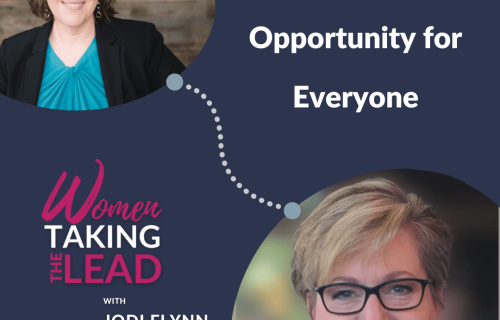100% Jodi: Delivering High-Quality Workshops
Click the play button to listen to the podcast episode.
Hello everyone and thank you for joining me!
It is a sunny and crisp October day here in Maine and I hope you are enjoying the current season you are in wherever you are in the world.
I had an opportunity recently to deliver a couple of full day workshops for a local organization and I was struck again by how much I love delivering workshops.
High-quality workshops are a fantastic way to deliver training in a way that allows the participant to start playing or grappling with the concepts you’re teaching.
The workshop format is ideal when you’re working with a group that will benefit from learning side by side, such as a team from the same company.
The workshop format is also ideal when the group would benefit from learning from each other. This could be a mix of people from different industries, backgrounds, level of experience, etc. The workshop can act as a conduit to exchange knowledge and provide feedback.
Workshops are one of my favorite ways to teach because the attendees get involved and start making the content meaningful for them. I will often turn a presentation into a workshop and it is always well-received.
When I think of workshops, I think interactive and engaged: workbooks, or worksheets, paired sharing, small group exercises, and whole group discussions.
In fact, as the person leading the workshop, the more I can minimize my time talking and maximize the time the participants are talking, the better.
Public versus Private Workshops
I’ve been asked to do workshops for organizations and I’ve also organized workshops for the public. Both of these can be gratifying and they each have their pros and cons.
When an organization asks you to do a workshop, they are going to take care of most of the logistics, marketing, and other communications. They are also going to pay you an agreed upon amount of money so even if some people need to back out, you don’t have to issue refunds. This situation takes a lot of work off your plate but you don’t have a lot of control either. You may not have any say in the location, the skill or knowledge level of the participants, choices for refreshments, etc.
The one thing you do want to make non-negotiable, if this applies to the workshop you are doing, is the limit to the number of participants in the workshop. Much like a classroom there is ideal ratio of facilitators to participants for maximum learning and engagement and that number will usually fluctuate between 16-20 participants to one facilitator. It all depends on the content of the workshop and the skill level of the participants with the particular topic you are addressing. You don’t want to set yourself up for a situation that could be frustrating and disappointing for both the participants and for yourself.
For an organization there’s also more work leading up to being asked to do the workshop. There’s likely been networking, an exploratory meeting to assess the specific needs, proposal writing and negotiation of the fine details before you even know you’re doing the workshop for sure. And there’s no guarantee you’ll get to deliver the workshop. All your effort may be for naught if they determine that now isn’t the right time or you are not the exact fit they are looking for.
You can usually earn more money doing workshops for organizations but also consider the amount of time you’ll invest before you get paid to deliver the workshop.
Now, if you are going to do a workshop yourself that is open to the public, you have much greater control over all the details of your event. You get to pick the location, the food and beverage choices; you can set criteria around who can attend based on skill level, and you have much more control over the date and time.
However, the marketing, sales, communications, and all the minute details are on you or a person you are paying to take on these tasks.
It’s not unheard of for someone to register and pay for you event only to realize they have a conflict and cannot attend. Know that they will likely ask for a refund even if you have clearly communicated a no-refund policy.
Also keep in mind, if your workshop doesn’t sell out in advance, you will be continuing to put time, energy and possibly money, into marketing your workshop and doing sales calls right up until the day before the workshop, or whenever your hard stop is.
You have much more control in this scenario but you also have a lot more work or have to pay someone to take on that work.
To be honest, I love both types of workshops. I love the whole process of getting to know an organization, their people, and their needs. I love being able to arrive with the majority of the details taken care of. I can then focus on giving the best I have to give.
I also love offering what I have to give to those who are working for themselves, or whose organizations don’t offer the type of training that I do. Even though it’s more work and often doesn’t pay as much as delivering a workshop for an organization, I find it to be incredibly gratifying.
If you’ve been delivering workshops in either scenario you know exactly what I’m talking about.
This will Serve You in Delivering High-Quality Workshops
To truly deliver a high-quality workshop you have to love it. Don’t get me wrong, there are components of the process that are not my favorite, like getting into the nitty-gritty of the timeline, but overall you need to have a passion for teaching and learning, and you have to be a bit of a performer.
Depending on the length of your workshop you may need to keep the energy of the room within a range that is conducive for learning. To do that, you need to keep the attention of the attendees on the topic at hand. I’m not saying you have to do a song and dance and some cartwheels to keep everyone focused on the matter at hand, but you do need to be interesting, engaging and bit entertaining.
There’s no getting this perfect. There are going to be times of the day when it’s easier to do than others and there are going to be some topics that are more challenging for some of your participants and their natural inclination will be to check out.
You need to know how to read the room and meet the needs that are before you. This may mean going back to the drawing board on a particular segment of your workshop to work on making it easier to digest or injecting more humor into it to keep everyone interested. It may mean taking an unscheduled break so everyone can stand, stretch, move around or refill their beverages.
Also, your own enthusiasm for teaching and the learning environment will infuse your participants with energy. If you’re having a good time, they are more likely to have a good time. People can tell if you’re having a good time or not and they use this to determine whether or not they are having a good time. Your enthusiasm and enjoyment may not win over ALL participants but you will win over most.
Now, private workshops may have one or two participants who didn’t want to be there and don’t initially see the value. But if you are good at your craft, and you don’t take their attitude personally, they will usually walk away saying they did pick up one or two new things that will be valuable to them.
I, personally, do not deliver any content that I don’t believe in or believe will be of value to anyone who attends my workshops. So, when someone arrives thinking they are wasting their time and they give me the opportunity to change that perspective, I feel so gratified. I’m not going to lie; it gives me a natural high.
Alright, we covered the difference between private and public high-quality workshops and the qualities that will make for a high-quality workshop. In the next episode I’m going into some best practices for planning and preparing your workshops.
If you’ve been doing workshops, I’d love to hear from you. What have your experiences been?
The workshops I do regularly are listed at womentakingthelead.com/workshops. If you have a need, whether your inquiring for an organization or you’re doing some research for yourself, I’d love to hear from you.
As always, I hope this was of value to you and here’s to your success!
Thank you to Our Sponsors
TextExpander lets you instantly insert snippets of text from a repository of emails, boilerplate and other content, as you type – using a quick search or abbreviation. Go to https://textexpander.com/podcast and select Women Taking the Lead from the dropdown list for 20% off your first year!
Zebralove Web Solutions: Close your online marketing skills gap, learn how to remain relevant in a quickly changing marketplace, and get ongoing support in promoting your businesses online. Stay ahead of the game by signing up for these Digital Marketing Forum. Go to womentakingthelead.com/zebraworkshops to register.
Women Taking the Lead Resources
Accomplished: How to Go from Dreaming to Doing: A simple, step by step system that gives you the foundation and structure to take your goals and make them happen.
Subscribe to Women Taking the Lead
If you enjoyed this episode subscribe in iTunes, Stitcher Radio, Google Play Music or iHeart Radio and never miss out on inspiration and community!


